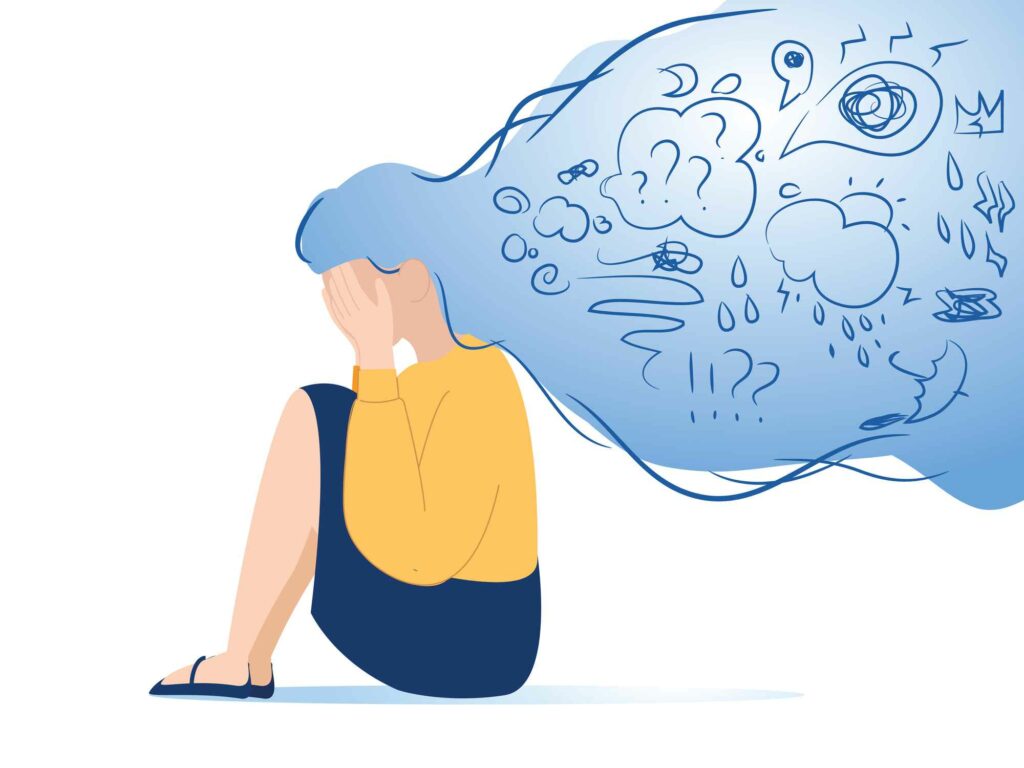Acute stress disorder is a recently recognized mental health condition that can occur in the aftermath of a traumatic event. It is characterized by symptoms such as intrusive memories, flashbacks, severe anxiety, and panic attacks. If left untreated, acute stress disorder can develop into post-traumatic stress disorder. In this blog post, we will discuss what acute stress disorder is, the signs to look for, and how it can be treated.
Contents
What Is Acute Stress Disorder?
 Acute stress disorder is a short-term mental health condition that can develop after a person experiences a traumatic event. It is similar to post-traumatic stress disorder (PTSD), but it occurs more immediately after the event and typically lasts for a shorter period.
Acute stress disorder is a short-term mental health condition that can develop after a person experiences a traumatic event. It is similar to post-traumatic stress disorder (PTSD), but it occurs more immediately after the event and typically lasts for a shorter period.
More often, ASD can be developed in other ways. For example, it can be set off by a car accident, a natural disaster, or a personal assault. It is characterized by symptoms that last for at least three days and up to one month after the event. These days, it seems like we are constantly bombarded with news of traumatic events happening all over the world. It is no wonder that rates of ASD have been on the rise in recent years.
Therefore, it becomes important to be able to recognize the signs and symptoms of acute stress disorder so that you can seek treatment if necessary. If you are struggling and feel like you might be developing ASD, please reach out to a mental health professional for help. Otherwise, it will be difficult to manage the condition and you might find yourself stuck in a cycle of anxiety and avoidance.
What Are The Signs And Symptoms?
There are three main groups of symptoms:
Re-experiencing the event
This can include flashbacks, nightmares, and intrusive thoughts. You may feel like you’re going through the event again. Re-experience of the event can be in the form of images, sounds, smells, or feelings. For instance, you may see the image of the person who died in a car accident every time you close your eyes.
Dissociation
It is common to feel detached from yourself or the world around you. You may feel like you’re in a dream or that you are outside of your body looking in. Time may also feel like it’s standing still or going very slowly. Dissociation, in simple words, is described as feeling disconnected from reality. And this happens if you feel disconnected from your thoughts, feelings, emotions, or physical sensations.
Avoidance
You may try to avoid anything that reminds you of the event. This can include:
- People
- Places
- Activities
- Thoughts
It is believed that avoidance is a way of numbing your feelings and can be a form of self-protection. By avoiding reminders, it is hoped that the memories will fade and eventually go away. Unfortunately, avoidance can actually make your symptoms worse and can lead to developing PTSD.
Distress
It is not uncommon to feel distressed after a traumatic event. For most people, these feelings are short-lived and eventually go away on their own. However, for some, the distress doesn’t go away and can even get worse over time. This is known as acute stress disorder (ASD). But it can even lead to post-traumatic stress disorder (PTSD).
Changes in mood and thinking
 Changes in mood and thinking are often one of the first signs that a person is experiencing acute stress disorder. The individual may become easily agitated, anxious, or depressed. They may also have difficulty concentrating or making decisions. These changes can last for days, weeks, or even longer.
Changes in mood and thinking are often one of the first signs that a person is experiencing acute stress disorder. The individual may become easily agitated, anxious, or depressed. They may also have difficulty concentrating or making decisions. These changes can last for days, weeks, or even longer.
Other signs and symptoms of acute stress disorder may include:
- Intrusive thoughts or memories of the traumatic event
- Flashbacks or nightmares
- Anxiety and fear
- Hypervigilance or feeling on edge
- Difficulty sleeping or concentrating
- Irritability or outbursts of anger
- Reckless or self-destructive behavior
If you or someone you know is experiencing these symptoms, it’s important to seek professional help. Acute stress disorder can be treated with therapy and medication. With treatment, most people are able to recover and move on from the trauma.
What Causes Acute Stress Disorder?
The causes of acute stress disorder are not fully understood, but it is thought to be the result of a combination of physical and psychological factors. Let’s discuss in more detail the physical and psychological causes of acute stress disorder.
Physical causes: Physical causes of acute stress disorder include a traumatic event, such as a car accident, natural disaster, or witnessing a violent act. It is thought that the physical stress of the event triggers a response in the body that leads to the development of acute stress disorder.
Psychological causes: Psychological causes of acute stress disorder include a history of mental health problems, such as anxiety disorders or post-traumatic stress disorder (PTSD). It is thought that the psychological stress of the event triggers a response in the brain that leads to the development of acute stress disorder.
Some other risk factors that may increase the likelihood of developing acute stress disorder include:
- Having a family history of mental health problems
- Experiencing a previous traumatic event
- Having a history of substance abuse
- Being in a situation where you feel powerless or out of control
If you have any of these risk factors, it does not mean that you will develop acute stress disorder. However, it is important to be aware of them so that you can seek help if you do experience a traumatic event.
Is Acute Stress Disorder More Common In People With PTSD?
 Acute stress disorder is believed to be more common in people who have PTSD. This is because the symptoms of ASD can be very similar to those of PTSD. People with ASD often relive their trauma through flashbacks and nightmares. They may also avoid anything that reminds them of the event.
Acute stress disorder is believed to be more common in people who have PTSD. This is because the symptoms of ASD can be very similar to those of PTSD. People with ASD often relive their trauma through flashbacks and nightmares. They may also avoid anything that reminds them of the event.
One theory suggested that people with ASD are more likely to develop PTSD because they have a higher level of stress hormones in their bodies. This theory is supported by the fact that people with ASD often have a hard time regulating their emotions.
In addition, a connection between acute stress disorder and PTSD has been found in studies that have looked at brain activity. People with ASD tend to have more activity in the amygdala, which is the part of the brain that controls fear and anxiety.
Therefore, both shares some risk factors and have some similar symptoms. However, it is important to remember that not everyone who has ASD will go on to develop PTSD. If you are experiencing any of the symptoms of ASD, it is important to seek professional help. Treatment can help you manage your symptoms and reduce your risk of developing PTSD.
How Does It Impact Life?
If someone has ASD, they might have a lot of trouble returning to their life as usual. They may avoid things that remind them of the traumatic event. And this can further lead to several consequences in life. So here are a few negative impacts that a person with ASD might experience:
Trouble going back to school or work
This is one of the most common reactions to a traumatic event. And it’s not surprising given that the place where the trauma took place becomes a trigger for anxiety and fear. So many people with ASD will avoid going back to school or work. For instance, your experience may cause you to fear driving, so you might avoid it altogether.
Isolation from friends and family
Another common reaction is to isolate oneself from friends and family. This is because the person feels like they are a burden to others and that no one could possibly understand what they are going through. It is also common to feel like you are in danger and that you need to be on guard all the time. This can lead to paranoia and mistrust of others.
Negative mood changes
One of the common consequences that people experience after exposure to a traumatic event is a shift in their mood. This can manifest as feeling on edge, irritable, anxious, or depressed. For instance, if you were in a car accident, you may find that you’re now afraid to drive. You may also have difficulty sleeping or concentrating.
Physical impacts
There are several physical health issues that people with acute stress disorder may experience. They may have trouble sleeping or might not be able to sleep at all. They may also have trouble eating or lose their appetite altogether. Headaches, chest pain, and rapid heartbeat are also common. People with acute stress disorder may feel like they’re in danger even when they’re not. This can lead to a heightened sense of awareness, which can make it hard to concentrate or focus on anything else.
ASD can last for a few days, weeks, or even months. Some people have had ASD for years. It is important to get help if you think you might have ASD. The sooner you get help, the better. It can impact your overall quality of life if not treated. Because of this, it’s important to be aware of the signs and symptoms. It’s also important to know that there are treatment options available.
How Is It Diagnosed?
Diagnosis is made by a professional such as a psychiatrist, psychologist, or clinical social worker. They will ask about your symptoms and how long you have been experiencing them. You will also be asked about any trauma you have experienced recently.
A diagnosis of acute stress disorder can be made if you have:
- Experienced a traumatic event
- Have symptoms that last for more than a month
- Have symptoms that interfere with your ability to function in your everyday life.
In addition, there are other methods of diagnosis that may be used such as the Structured Clinical Interview for DSM-IV or the Clinician-Administered PTSD Scale. It is important to remember that only a professional can make a diagnosis of acute stress disorder.
If you think you may have an acute stress disorder, it is important to seek help from a mental health professional. Early treatment can be vital in preventing the development of chronic PTSD. There are many effective treatments available for PTSD, and with treatment, most people are able to recover.
How To Treat It?

Treatment for acute stress disorder is similar to that of PTSD and generally includes a combination of medication and therapy. Let’s discuss this in more detail below.
Therapy
It is always considered the first line of defense against acute stress disorder. The most common therapy types are:
- Cognitive-behavioral therapy (CBT) is the most commonly used type of therapy. It helps you understand your thoughts and feelings about the event and teaches you how to change your thinking and reactions.
- Exposure therapy is another type of CBT that slowly exposes you to memories or situations that remind you of the event. This can help you work through your fears and start to feel better. For instance, if you were in a car accident, your therapist may have you drive on the freeway again.
- Eye movement desensitization and reprocessing (EMDR) is a type of therapy that uses eye movements and other forms of bilateral stimulation to help you process the event.
These therapies are often used in combination with each other or with medication. Also, you should work with a therapist who is experienced in treating people with acute stress disorder.
Medication
There are a few different types of medication that can be used to treat acute stress disorder, including:
- Antidepressants can help with symptoms such as sadness, worry, and sleep problems.
- Anti-anxiety medications can help to reduce anxiety and make it easier to sleep.
- Beta-blockers can help to control some of the physical symptoms of acute stress disorder, such as rapid heart rate and trembling.
If you’re interested in trying medication for your acute stress disorder, talk to your doctor about what might be right for you. It’s also important to note that medication is not a cure for acute stress disorder, but it can be an effective treatment option for some people.
Acute stress disorder can be a very difficult experience, but with treatment, people can recover and go on to lead healthy and happy lives. If you or someone you know is struggling with acute stress disorder, don’t hesitate to reach out for help.
Is ASD Prevention Possible?
Prevention is key when it comes to any mental disorder, and ASD is no different. Early intervention and treatment are critical for those who suffer from ASD. Here are some things that can be done to prevent the development of ASD:
- Educate yourself about stress and its effects on the body
- Identify your personal stressors and find healthy ways to cope with them
- Build a support system of family and friends
- Practice relaxation techniques such as yoga or meditation
- Exercise regularly
- Get enough sleep
While there is no surefire way to prevent ASD, these tips can help reduce your risk. If you or someone you know is struggling with ASD, don’t hesitate to reach out for help. There are many resources available to support you on your journey to recovery.
It is important to learn about stress and how it affects the body in order to prevent ASD. If you or someone you know is suffering from ASD, don’t hesitate to reach out for help because there are many resources available. With the right treatment, ASD can be managed and even prevented.
Conclusion
To conclude, acute stress disorder is a very real and serious condition that can have a profound effect on a person’s life. If you think you or someone you know may be suffering from ASD, it is important to seek professional help. With proper diagnosis and treatment, however, many people with ASD can go on to lead happy and fulfilling lives.
For more tips and guidance, you can reach out to Therapy Mantra. The team of professional counselors is more than happy to help you in your journey to recovery. Contact us today to learn more about our services. You can also book an online therapy session or download our free Android or iOS app.


